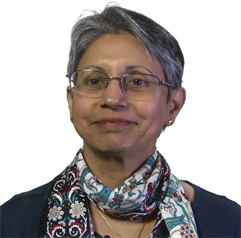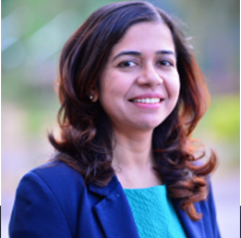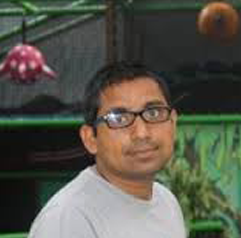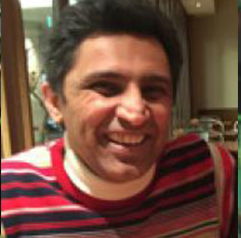International Symposium on Bioinformatics 2019 (InSyB 2019)
December 21-22, 2019
Symposium email: hmv.insyb2019@gmail.com
<December 21-22, 2019
Symposium email: hmv.insyb2019@gmail.com
<About the Institution
"Acknowledged as 'College of Excellence' by UGC, 'Excellent College Imparting Public Service Programmes in Punjab' by AICTE, MHRD, New Delhi, 'Flagship College by Confederation of Education Excellence (CEE) in association with ECONS and awarded with Edupreneurs Award' by Times of India and FICCI Higher Education Excellence Award, ASSOCHAM Education Excellence Award, Hans Raj Mahila Maha Vidyalaya, Jalandhar, a premier institution of North India has entered the centennial decade of its origin. The institute functions under the DAV College Managing Committee which is the largest Non Govt. Organization established with an aim to carry forward the dreams of great visionaries like Swami Dayanand Saraswati, Mahatma Hans Raj and Mahtma Anand Swami. Mahatma Hans Raj laid the foundation of this institution in Lahore in 1927 with the noble mission of educating & empowering girls. Ever since its inception, the college has been committed to the cause of women education. At present, this is one of the oldest institutions established by DAV College Managing Committee, operating under the supervision and guidance of a great visionary leader Dr. Punam Suri, Padmashree Awardee, President, DAVCMC, New Delhi. The college has the unique distinction of having been re-accredited with Grade A by NAAC with highest score.and recipient of the Pradhan Mantri Kaushal Vikas Yogna.'.Keeping pace with the accelerated rate of growth, the institute offers a balanced curriculum complemented with inculcation of moral fibre and fortitude. HMV is the only college in the region which is running M.Sc. Bioinformatics under Guru Nanak Dev University.
About APBIONET & InSyB
"Founded in January 1998, APBioNet is dedicated to the advancement of the field of bioinformatics with an Asia-Pacific focus. APBioNet has organizational and individual members from over 27 countries in the region, from industry, academia, research, government, investors, and international organizations. Its mission since inception has been to pioneer the growth and development of bioinformatics awareness, training, education, infrastructure, resources, and research among member countries and economies. It is spearheading a number of key bioinformatics initiatives in collaboration with international organizations and industry partners. Specifically, improving the bioinformatics network infrastructure, facilitating the exchange of data and information, developing training programs, workshops, conferences and symposia, and promoting regional collaboration in the field of bioinformatics.
The International Symposium on Bioinformatics (InSyB) bridges the gap between InCoB (International Conference on Bioinformatics) and irregular local APBioNet-supported workshops or training courses. The two day annual InSyB is expected to be centred on topics relevant to the local organizer. A mix of keynotes, short talks, discussions, poster sessions, and “meet the expert” opportunities shall foster an interactive environment for integrated bioinformatics research and education."
About InSyB2019
Advances in Life sciences have led an era of looking biological problems at molecular level and with further advances in Biotechnology, we are now in a position to manipulate living organisms for a variety of societal, industrial, agricultural and medical applications. The modern day biology has turned more efficient in handling complex biological issues including Cancer, Diabetes, Crop improvement and environment at genomics level thereby requiring high throughput experiments, which further generate a high throughput data. We need efficient approaches to store, manage, retrieve and analyze this mammoth of data to answer many interesting questions. Sensing, the importance of Computational Biology, the ISCB as well as APBIONET has been playing vital role in development of this scientific discipline through a number of ways. APBIONET has been able to make a significant impact by organizing many brand events including InSyB.
Similarly, Department of Bioinformatics, Hans Raj Mahila Maha Vidyalaya Jalandhar has been very active in making researchers aware of various concepts of bioinformatics and helping them to increase their skills, as well as impact of their research. We have conducted a number of workshops, seminars, conferences since the establishment of this department, including the recent International event “Indian Conference on Bioinformatics 2019 (Inbix’19)” in February 2019. We believe that InSyB 2019 at our college will help in bringing many researchers working on various aspects of Bioinformatics, and the academic community on a common platform. This initiative, therefore, will not only create awareness among participants but also motivate many students to choose Bioinformatics as a career, ultimately leading to human resource development in this specific area.

Prof. Shoba Ranganathan
Professor of Bioinformatics, Department of Chemistry and Biomolecular Sciences, Macquarie University, Australia

Dr. Sonika Tyagi
Head, Bioinformatics Research Group,
Research Affiliate - Monash eResearch Centre, Monash University, Australia

Dr Gareth Price
Head of Computational Biology, QFAB Bioinformatics, Institute of Molecular Bioscience, University of Queensland, Australia

Dr. Prashant Suravajhala
Scientist, Birla Institute of Scientific Research, Jaipur

Prof. Shandar Ahmad
Professor, School of Computational and Integrative Sciences, JNU, New Delhi

Dr. Abhishek Kumar
Faculty Research Scientist, Institute of Bioinformatics, Bangalore
Advisory Committee
Organizing Committee:
Chief Patron : Dr. Punam Suri, Padma Shree Awardee, President DAVCMC, New Delhi
Patron: Justice (Retd. )N. K. Sud, Vice President DAVCMC, Chairman LC
Director: Sh. S. R. Gaur (IAS), Director (Higher Education), DAVCMC, New Delhi
Organizing Chair : Dr. Prof. (Mrs.) Ajay Sareen, Principal,
Sh. S. R. Gaur (IAS), Director (Higher Education), DAVCMC, New Delhi
Convener: Dr. Harpreet Singh, Head Department of Bioinformatics
Co-Convener: Dr. Jitendra Kumar. Head Department of Biotechnology,
Mrs. Purnima, Assistant Professor, Department of Bioinformatics
Organizing Secretary: Dr. Anjana Bhatia, Head Department of Botany
Joint Secretary: Dr. Seema Marwaha, Head Department of Zoology
Local Organizing Committee members
Technical & Secretarial Assistance
Main Tracks
Bioinformatics, Healthcare Informatics, Cancer Genomics, Informatics for Agriculture, Structural Bioinformatics, Molecular Evolution & Population Genomics
Sub-tracks (include, but are not limited to):
Guidelines
ORAL PRESENTATION
Presentation time
Material
POSTER PRESENTATION
Schedule: Will be updated shortly
Workshop: Workshop on NGS Data Analysis using GALAXY Platform
The second day of InSyB2019, 22nd December, 2019 will be a great opportunity to learn analysis of Next Generation Sequencing Data using GALAXY Platform. The workshop will give an introduction to NGS and its applications followed by an introduction to GALAXY platform. The practical hands-on will cover pipelines for RNAseq Analysis and Variant Calling. Due to limited number of seats available you are requested to choose option to attend workshop on the registration form. There will be not be any additional charge for this workshop.
| Registration categories | Fee (INR) | |||
|---|---|---|---|---|
| Before 05-12-2019 | After 05-12-2019 | |||
| Indian | Foreign | Indian | Foreign | |
| Delegates | Delegates | Delegates | Delegates | |
| Academia | INR 2000 | 70 USD | 2500 | 85 USD |
| Research Scholars (including Ph. D and Post Docs) | INR 1200 | 30 USD | 1500 | 40 USD |
| Industry | INR 4000 | 100 USD | 6000 | 120 USD |
| Students | INR 800 | 20 USD | 1000 | 30 USD |
| Accompanying person | INR 1000 | 20 USD | 1000 | 30 USD |
ISCB, APBioNet, Bioclues members (excluding students) receive a 20% discount. Group discount (at least 5 in a group) of 10% applicable
The fee can be paid online in the Bank Account with the following details:
Bank Name: Punjab National Bank
Account No. : 4710000100017566
IFSC Code: PUNB0471000
Branch HMV Campus, Jalandhar
SWIFT code: PUNBINBBJCL
The payment may also be made through demand draft in favour of the “Principal Hans Raj MahilaMaha Vidyalaya Jalandhar”
Sponsorship Packages
Gold Sponsor (INR 50,000): Free Registration for two representatives, Stall (9 x 6 ft)
Silver Sponsor (INR 25,000): Free registration for one-person Stall (6 x 6 ft)
Bronze Sponsor (INR 15,000): Stall (4 x 4 ft)
PASSPORT & VISA REQUIREMENTS
Online visa can be applied at the site https://indianvisaonline.gov.in/VISA Requirement
Different categories of Visas with specific endorsement of number of entries allowed and duration of stay in India are mentioned on the Visa depending upon request and subsequent decision of the Visa issuing authority.
Foreigners may also look for specific endorsement, if any, on the Visa for their guidance.
In case of any doubt, they may seek clarification from any of the Indian Missions abroad. Nationals of Nepal and Bhutan do not require Visa to enter India. However, citizens of Nepal & Bhutan require a Visa when entering India from China.
A citizen of Maldives visiting India for a short period, up to 90 days, is exempt from the requirement of Visa, as a special case, provided he/she holds a valid Passport issued by, or on behalf of Government of Maldives. This Visa free entry is allowed for the tourism purpose only. The period of 90 days shall include any prior period of stay of such foreigner on Tourist Visa Sticker in India during a period of six months immediately preceding the date of his/her entry into India.
The Maldivians who want to visit India for a period of more than 90 days shall get Visa issued a separate Visa regime exists for diplomatic/& official passport holders.
Overseas Citizen of India (OCI):-
Passengers who are carrying old cancelled passports having Life Long Indian "U" Visa Sticker affixed on it along with new passport are allowed entry into India.
Even if the OCI card holder acquires nationality of a different country, except that of Pakistan and Bangladesh, he/she is also allowed entry into India provided he/she is carrying his/her old passport having Life Long Indian "U" Visa sticker pasted on it along with the new passport of the recently acquired nationality.
For details, please consult the weibite: https://boi.gov.in/content/visa-requirement
Visa Application Invitation Letters: Will be provided later on the symposium website.
HEALTH REGULATIONS & SERVICES
Jalandhar is a hub of medical and facilities in Punjab with a large number of corporate as well as public hospitals and health care centers equipped with state-of-the-art instruments and well known professionals in their fields.
INTERNATIONAL & LOCAL TRAVEL
International travel can be done by Air as well as sea routes. Presence of International Airport at Amritsar (about 90 KM away from Jalandhar) makes International travel by air most suitable from major countries. For other destinations, Indra Gandhi International airport at New Delhi is the best destination with many options of connecting flights from New Delhi to Amritsar around the clock. Local travel can be done through very well connected rail as well as road facilities.
CURRENCY & BANKING
The currency of India is Rupees (Rs.). 1 USD is equal to 71.52 Rupees (approximately) Business transactions can be done through cash, Debit, Credit cards and other online mobile Apps and web portals.
TOURISM
Punjab, especially Amritsar is a great tourist attraction. There are number of sites to visit including Shri Devi Talab Mandir, Rangla Punjab, Jange-Azadi, Golden Temple Amritsar, Durgiana Temple, Jallian Wala Bagh, Wagha Border, War Memorial and other sites at Amritsar. Apart from Amritsar, Chandigarh, the capital of Punjab state is known as the City Beautiful and offers a lot of tourist attractions including Sukhna Lake, Rock Garden, Rose Garden, Zoo, Pinjore Garden etc. From Jalandhar, one can travel to other neighboring states of Himachal Pradesh, Uttrakhand, Rajasthan, Delhi, Haryana, Jammu & Kashmir etc.
WEATHER & DRESS
December is in the winter in Jalandhar and is typically the 2nd coldest month of the year. Daytime maximum temperatures average around 21°C (70°F), whilst at night 6°C (43°F) is normal. So, Keep yourself ready with warm winter dresses.
WEATHER & DRESSINTERNET & TELEPHONE
The campus has wired as well as wireless (Wi-Fi) internet facility with a speed of 55 MBPS. The Jalandhar city has an excellent mobile connectivity.
Copyrights © 2018-2025 HRMMV, All Rights Reserved.Developed & Powered by Innovative Solution Technologies | ISOLS Group